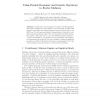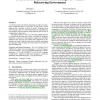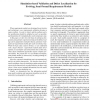62 search results - page 3 / 13 » Evolving similarity functions for code plagiarism detection |
144
click to vote
GECCO
2007
Springer
15 years 5 months ago
2007
Springer
We have developed a technique to characterize software developers' styles using a set of source code metrics. This style fingerprint can be used to identify the likely author...
108
click to vote
RAID
2009
Springer
15 years 7 months ago
2009
Springer
In this paper, we leverage the concepts of formal grammar and genetic operators to evolve malware. As a case study, we take COM infectors and design their formal grammar with produ...
109
click to vote
GECCO
2006
Springer
15 years 4 months ago
2006
Springer
In this work, we employed genetic programming to evolve a "white hat" attacker; that is to say, we evolve variants of an attack with the objective of providing better de...
126
click to vote
PEPM
2009
ACM
15 years 5 months ago
2009
ACM
A well-known bad code smell in refactoring and software maintenance is duplicated code, or code clones. A code clone is a code fragment that is identical or similar to another. Un...
103
click to vote
APSEC
2005
IEEE
15 years 6 months ago
2005
IEEE
When requirements models are developed in an iterative and evolutionary way, requirements validation becomes a major problem. In order to detect and fix problems early, the speci...



